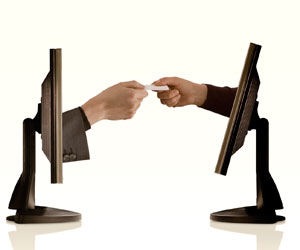 Feb. 16, 2011 – Google’s market share for law-related searches in the United States is more than 90 percent. That means if you provide legal services to consumers, being on the first page of Google’s search results is critically important.
Feb. 16, 2011 – Google’s market share for law-related searches in the United States is more than 90 percent. That means if you provide legal services to consumers, being on the first page of Google’s search results is critically important.
The search engine tool has displaced the Yellow Pages directory for most consumers as their go-to resource for information about local products and services, and research shows that Google users’ search behavior shifts away from navigating to page two of the search results (and even scrolling to the bottom of page one).
As Google continues to refine its remarkable local search results and makes it much easier for users to find local goods and services, lawyers and law firms should consider the free tools – like Google local search and Google Places – available to help market legal services.
This article explores ways in which lawyers and law firms can use search engine optimization – the process of improving visibility on the Internet – to harness the power of Google in advertising their legal services. Our company, LegalPPC, also specializes in developing and managing ad campaigns to help lawyers reach the desired top slots on Google.

Google local search
Google local search has undergone amazing improvements in recent months and now lawyers see local listings in the organic search results, as well as in the sponsored listings, regardless of whether they input a geographic qualifier like “Milwaukee.”
Recently, you will notice that Google displays maps in the top right corner of its search results and lists seven or fewer local businesses with their locations marked by red flags labeled “A” through “G.” These seven results have come to be known as the “7-Pack.”
Since this listing and map appear above the index and scroll bar, it is an extremely desirable place to have your law office website appear when someone is searching for legal services.
Getting your website into the 7-Pack has always been challenging, but search engine optimization (SEO) experts have found that Google favors local businesses in its 7-Pack results when that local business has claimed, verified, and completed its Google Places page.
Why bother with Google Places?
Google Places is a repackaged and expanded version of what used to be called Google Local Business. It is a place on the Google where lawyers and law firms can list important business information for Google users, such as a law firm address, telephone number, operating hours, and Internet Protocol (IP) address.
Completing the Google Places page has the advantage of giving Google users reliable information about lawyers and law firms. Otherwise, Google relies on information that it gathers elsewhere on the Web, which may not always be current or accurate.
Additionally, a completed Google Places page is believed to have significant benefits with respect to the 7-Pack and allows lawyers to take advantage of Google “Tags” and Google “Boost,” recent tools that make listings more prominent on Google Maps and in the 7-Pack.
Google advertising opportunities through Google Tags and Boost are beyond the scope of this article, but more information about these offerings can be found at the LegalPPC website.
Claiming and verifying your Google Places page
To get started, go to: www.google.com/local/add/businessCenter, and sign into your Google Account. If you don’t have one, click “Create an account now” and follow the steps. Once you’re logged into your Google Account, click on the link that says “List your business.”
Enter your law firm’s phone number and click on the “Find business information” button. If Google has information about your business associated with the phone number you provided, you’ll see a page with a button labeled “Edit” next to your firm name. Otherwise you’ll need to start from scratch.
Sometimes Google will have more than one Google Place associated with your phone number, which will be evident if you see more than one “Edit” button.
If it turns out that there is more than one listing associated with your telephone number, go through the verification process (described below) for each listing first and then select “Remove from Maps” for the extra ones.
Edit your law office information. Click the “Edit” button and ensure that all of the contact information is up to date. Complete every field. Your address should be an actual street address, not a P.O. box, so Google can pinpoint your law office in its Maps results. Your phone number should have a local area code to help Google locate you. Avoid using an “800” type of toll free number.
Add a description. Google gives you a text box to describe your legal services to its users who click through to your Google Places page.
Choose up to five categories. It is important that you choose the maximum number of categories allowed (5). Even though Google sets the categories and they appear somewhat arbitrary, you can add “custom categories” by typing in your areas of law directly, for example, “Patent Attorney.”
Hours of operation and payment options. Hours of operation and payment options are not critical information for users, but Google favors more complete listings over less complete listings. Add the hours that your office is open and the types of payment people can use to pay for your services.
Add up to 10 photos and five videos. Add a logo and some photos of your location or staff. These will personalize the listing for users and Google will reward you for having a more complete listing. If you have any videos about your law practice or other helpful legal content, upload them to YouTube and put the links here.
Verify your profile. Verifying your profile is extremely important and it’s how Google knows that you are the “owner” of the Google Place. Google usually but not always provides two options to verify the Place profile: by phone or postcard. If it is offered, choose telephone verification because this option allows you to immediately verify your listing and continue. When you click “By phone” a machine from Google will immediately call the telephone number associated with your listing and give you a five-digit PIN number.
If you have to verify by postcard, bookmark the page. You’ll need to return to the verification page in several weeks when you receive the postcard Google sends with the PIN number listed. Whether you receive the PIN number by telephone or postcard, enter it in the space provided and click “Go.”
Get positive reviews from clients. Google claims that there is no correlation between the number of reviews a business has and the placement of that business in Google’s 7-Pack, but experts have noticed that there appears to be a relationship. Consequently, lawyers and law firms should try to get satisfied clients to post reviews.
It’s important that the reviews come from actual satisfied clients and that they come gradually. Google will notice if the reviews all come from the same IP address and if they come at an increased frequency. Each review should come from a unique computer and should be spaced in time, maybe one review every few weeks.
If you’re a solo practitioner or small law firm and have any questions about Google Places or about Internet marketing opportunities generally, please contact me at ken@legalppc.com or visit the LegalPPC website.
About the Author
Ken Matejka earned his B.A. degree from Marquette University in 1985, his J.D. degree from the University of California-Hastings College of Law in 1988, and his L.L.M. in taxation from New York University Law School. Matejka is a California-licensed attorney and managing partner of LegalPPC.com, a San Francisco-based Web marketing company dedicated to helping solo practitioners and small law firms get more clients from the Google search engine.
Related:
